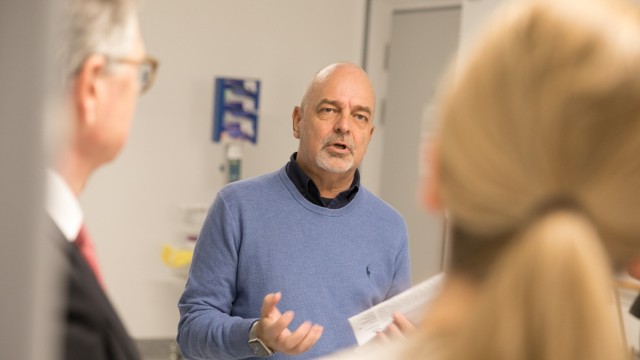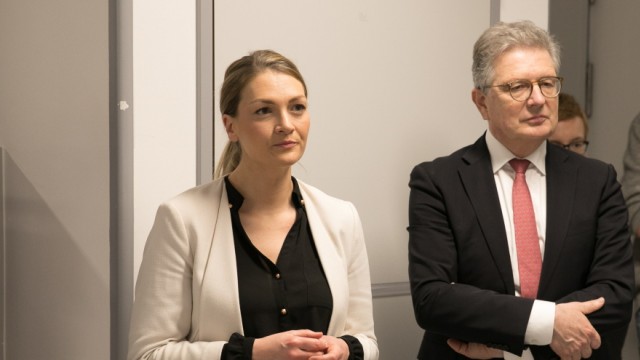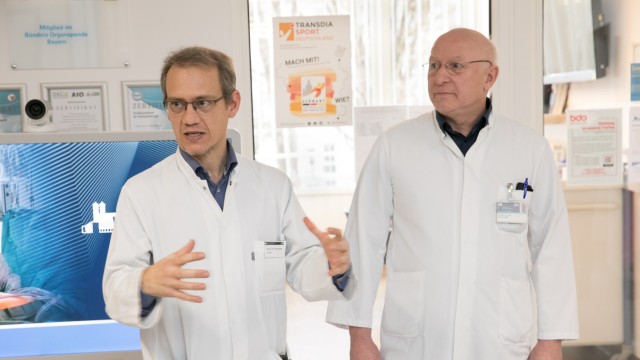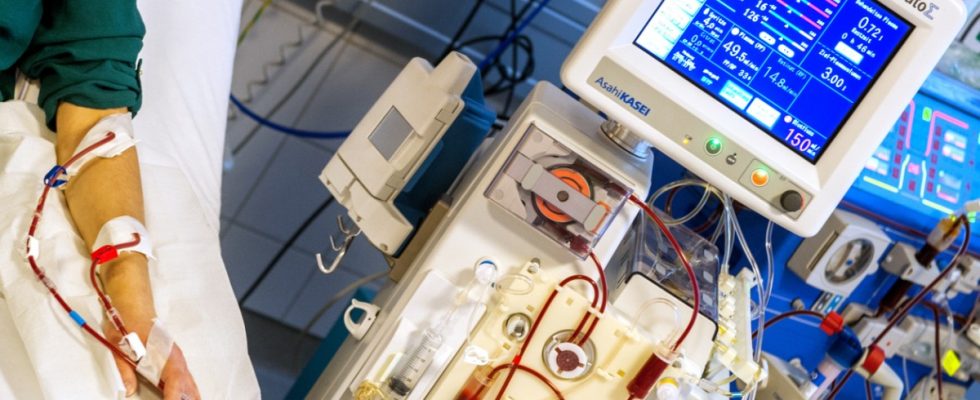She beams. Eva, 63, hugs her husband closely. Gregor, 50, puts his arm around his wife. He does this again and again. “My darling,” he says and strokes her back. They both look like a young couple in love.
Gregor donated a kidney to Eva last September. They have been working towards this moment for two and a half years. And then, he says, he was just really afraid that something might be wrong with his kidney. “But everything worked out,” he says.
Doctors, nurses, visitors – everyone on the M1a ward listens to them and enjoys the couple’s happiness. Also Bavaria’s Health Minister Judith Gerlach (CSU), who visited the transplant center at the Rechts der Isar University Hospital on Tuesday. She wants to know more about the two of them. “What did it feel like after the transplant?” she asks. “An incredibly liberating one,” Eva answers briefly and clearly. “So much has been given to me.” Gerlach asks the donor Gregor how much he now has to restrict himself in his life. “I shouldn’t ride a motorcycle,” he explains and laughs. “It’s not bad, I didn’t do it before.”
90,000 people in Germany need dialysis
Ten million people in Germany have chronic kidney disease. “Many people often don’t even know because the symptoms don’t hurt at first,” explains Uwe Heemann, head of the nephrology department. 90,000 people in Germany currently have such severe kidney damage that they have to undergo dialysis, i.e. they need blood washing. According to Heemann, around 7,000 people are hoping for a donor organ and are on the waiting list of Eurotransplant, an organ donation placement agency. The waiting time for an organ: approximately nine years.
Organ donation recipient Eva with her husband Gregor, her organ donor.
(Photo: Florian Peljak)

Dialysis patient Jörg Schiemann in conversation with Bavaria’s Health Minister Judith Gerlach. This is the second time he is waiting for a donor organ.
(Photo: Florian Peljak)
Jörg Schiemann knows all too well how long this waiting time can be. He also tells the Minister of Health about his fate. He needs a new kidney for the second time. The now 56-year-old had his first transplant 15 years ago. Now he has to go on dialysis. Like before. It took four and a half years until a suitable organ was found for him. He’s been waiting for five years again. Schiemann, who works in digital health promotion and even gives lectures about his illness, knows that it will probably be a while before a kidney is found for him. “I try to enjoy the moment,” he says. He rides his bike a lot when he’s not too tired.
2,100 kidneys were transplanted into the right bank of the Isar
The transplant center at the University Hospital Rechts der Isar has existed since 1985. It was renovated in April 2023. Six rooms, named after Munich districts, and twelve beds are available. More than 2,100 kidneys have been transplanted in more than 40 years, 500 of which were living donations. “The biggest challenge,” says Lutz Renders, “is the missing organs.” The head of the kidney transplant program explains the reasons why there are simply not enough donor organs. People are getting older and older, but also getting sicker. The quality of donor organs would also decrease.
Doctors and patients agreed this afternoon: There should be more donors. The solution could only be the so-called contradiction solution. This means that everyone is a potential donor unless they have expressly objected to organ removal during their lifetime. The extended consent solution currently applies in Germany. Organ donation is therefore only possible if the donor consents during his lifetime or his next of kin has consented. This is very difficult to implement in reality, says Heemann. “For example, should you immediately ask the relative who has just lost a loved one whether organs can be removed?”

Bavaria’s Health Minister Judith Gerlach and Martin Siess, the medical director of the Rechts der Isar Clinic.
(Photo: Florian Peljak)

The specialists, here senior physician Volker Aßfalg (left) and Lutz Renders, also work with so-called rescue organs.
(Photo: Florian Peljak)
“We simply need the contradiction solution that already exists in many countries,” emphasizes Minister Gerlach. “We have to do everything we can to increase the willingness to donate.” You should also consider the topic of organ donation at least once in your life. “It can affect us all.” In any case, she always carries her organ donor card with her.
In the transplant center at the University Hospital Rechts der Isar, doctors are now also working with so-called “rescue organs”. In other words, with organs that are not needed in other countries because there are either more donors or because no recipients have been found. “They mostly come to Germany from neighboring countries,” explains senior physician Volker Aßfalg when asked by the minister. Special algorithms have been developed that would help find suitable donors. “We also reject 96 percent,” he says, “but we can accept four percent and transplant them successfully.”
To match her pink jacket, Eva wears boots with high stiletto heels. They could give Gregor a lot of trouble while dancing salsa. Eve laughs. But it doesn’t happen. Doing something together has been Eva and Gregor’s greatest joy since the successful transplant. “I’m finally feeling well again,” says the 63-year-old. She wants to go diving again soon. But first we go to the city of lovers, Venice.

